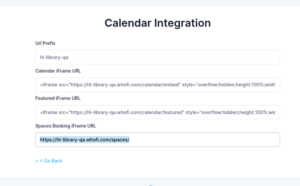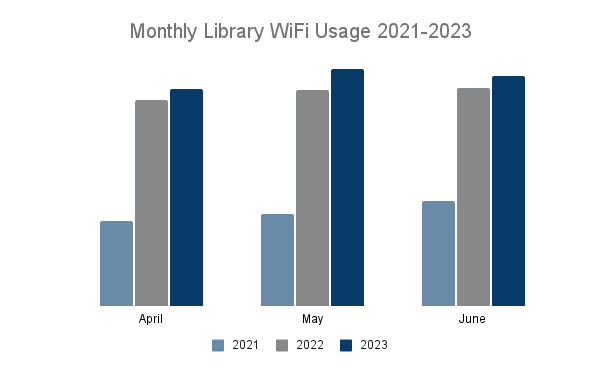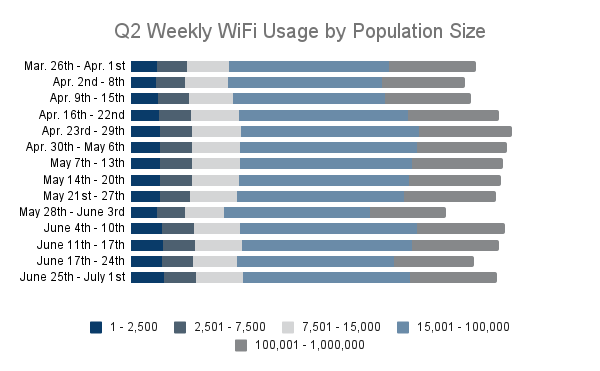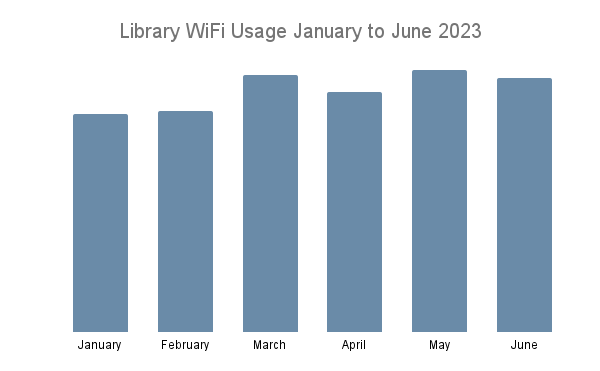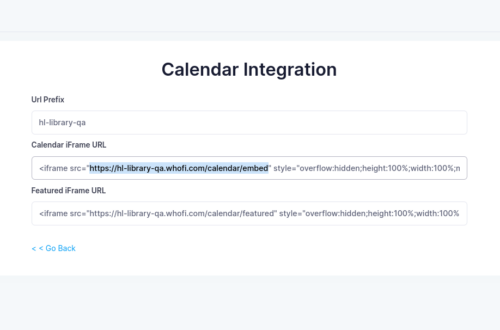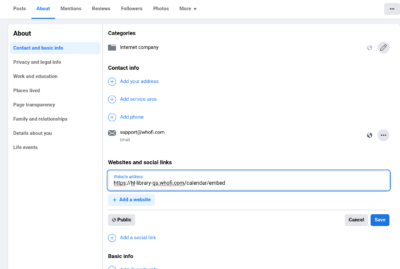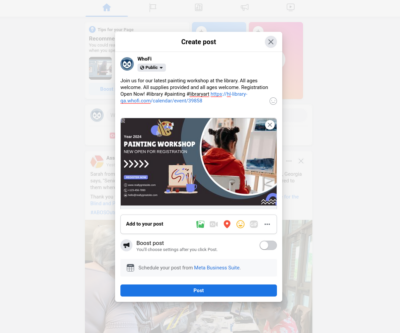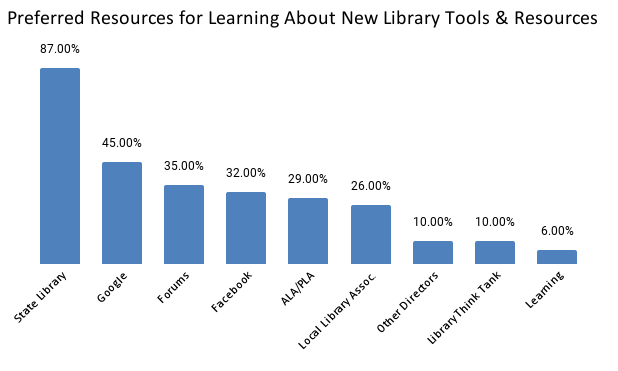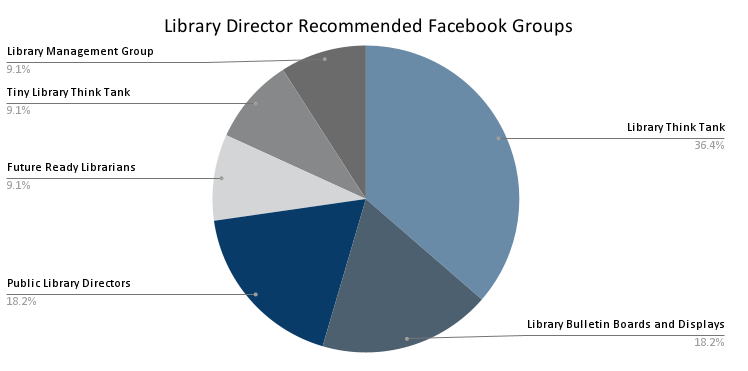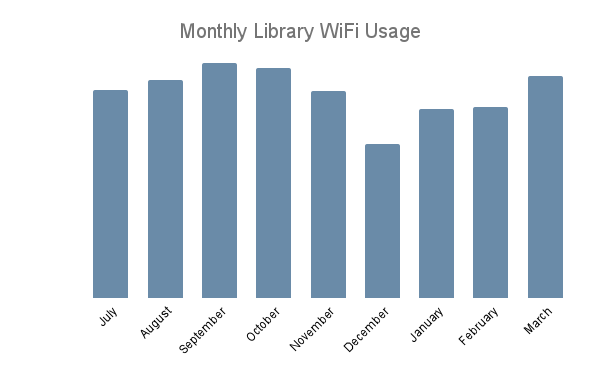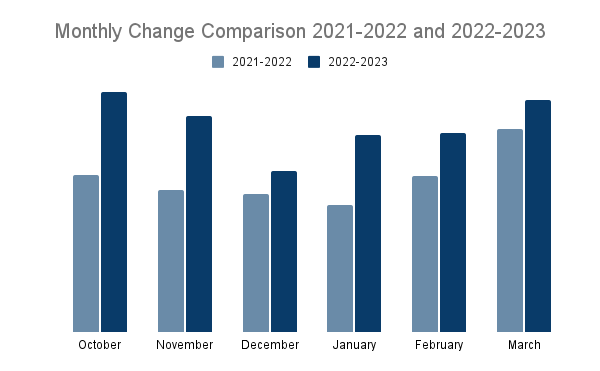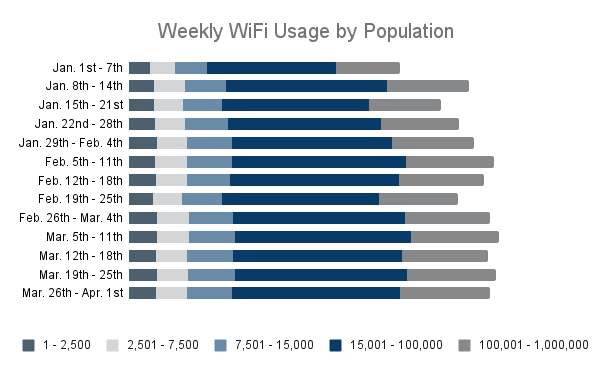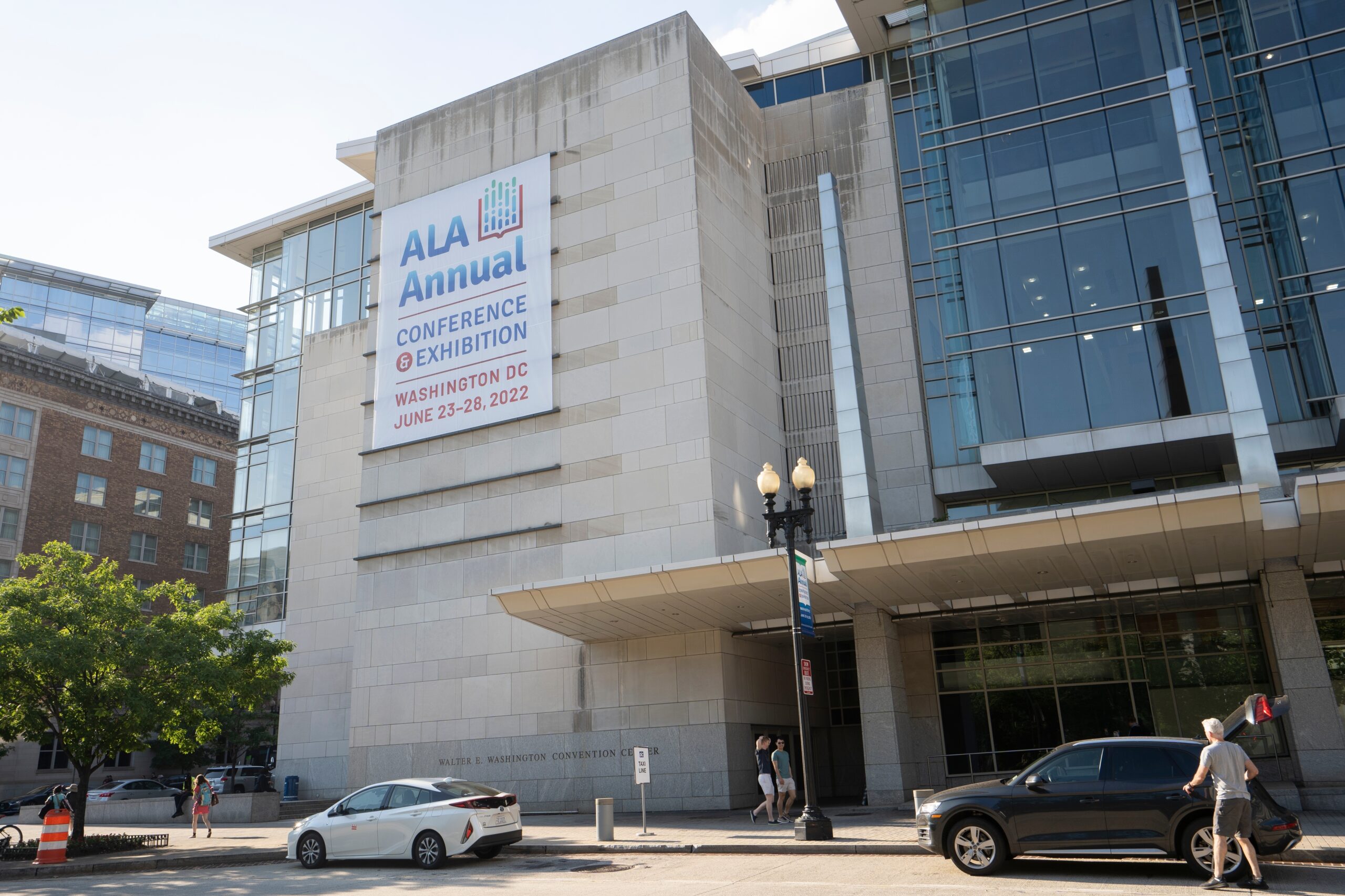Adding the Meeting Rooms Booking System on the Library Website
In this post, we will be diving into the world of online room reservation systems. More specifically, we will work through integrating the Meeting Rooms booking system seamlessly into your library website. If you prefer to video format you can find video instructions at the bottom of this page!
Step 1: Setting Up the Meeting Rooms Booking System
First, log in to your WhoFi account and navigate to the Setup section. In the advanced settings, find the 'Integration' option under the Community Calendar section. You'll find the Spaces iFrame URL here which is the code you will use to begin accepting patron reservations online through Meeting Rooms.
Step 2: Integrating with Your Library Website
Now, onto your library website. Whether you are using WordPress or a similar platform, the process is straightforward. Go to the Admin section and locate the page where you want to feature your meeting rooms.
- For Buttons:
- Add a new button or edit an existing one by hovering over it and selecting the pencil icon.
- Paste the URL in the designated section and click save.
- For Hyperlinks:
- Highlight the text you want to link on your webpage.
- Select the chain link icon, paste the URL in the designated section, and click save.
By integrating this meeting rooms booking system into your library website, you are making your library spaces more accessible to patrons. We hope you are enjoying the simplicity of the Meeting Rooms booking system. By following these steps, you have streamlined the process for patrons to reserve spaces, enhancing their library experience.
We extend our gratitude to our partners whose dedication led to the creation of this system, making it easier for all libraries to manage their spaces.If you have any questions of need further assistance, our support team is just an email away at support@whofi.com. For more information and the full tutorial for Meeting Rooms you can review this previous post. Happy reading and happy reservations!
https://youtu.be/nDtUEWRoE5Q
What is Room Reservation Software for Libraries?
Due to growing demands for remote worker and community leaders, public libraries have become essential hubs offering maker spaces and study rooms. However, managing these dynamic spaces efficiently has posted significant challenges. Some directors have found a solution in room reservation software for libraries.
The Challenges:
-
Outdated Reservation Methods: Relying on handwritten notes, spreadsheets, or generic web calendars led to confusion and frustration for both library staff and patrons.
- Limited Visibility: Patrons struggled to find accurate information about room availability, leading to misunderstandings and wasted time.
- Inefficient Management: Managing room requests and program schedules manually proved to be a cumbersome task for librarians, causing inefficiencies.
- Lack of Reporting: Libraries often lacked comprehensive reporting tools, hindering their ability to analyze space utilization effectively.
The Solution:
Library Room Reservation Software simplifies the entire process, making room reservations more accessible for patrons and easier to manage for librarians. Here's what an effective room reservation software for public libraries should offer:
Patron-Friendly Booking: Empower patrons to easily view room availability, check amenities, and submit reservation requests.
- Seamless Integration: Integrate with the library’s website for a cohesive and user-friendly experience.
- Simplified Management: Enable librarians to efficiently manage room requests, program schedules, and other resources, all in one centralized place.
- Robust Reporting: Provide librarians with detailed reports designed in collaboration with libraries, simplifying the process of reporting to boards and the state.
- Integration with Library Calendar Software: Ensure seamless integration with the library’s calendar software to prevent double bookings and automatically reserve rooms for programs.
Library spaces reservation software significantly reduces the burdens associated with managing spaces effectively for both patron reservations and programs. It offers clarity and ease, benefiting both library staff and patrons alike. If you would like to learn more you can check out the video below or find more details at whofi.com/learn-more/spaces.
https://youtu.be/PkXIlDClLWY
New Product Update: Meeting Rooms for Libraries
Announcing a new service from WhoFi, Meeting Rooms serves library and community spaces by simplifying program planning and room scheduling reservations for patrons and staff. In an era of remote work and evolving community needs, libraries continue to play a crucial role by offering co-working spaces, meeting rooms, and programs that bring communities together. While libraries adapt to these changing demands, they also encounter new challenges in fulfilling these needs effectively.
Meeting New Challenges
Meeting Rooms from WhoFi helps librarians simplify these processes, offering a solution to growing library space management challenges. This intuitive service empowers patrons by providing a user-friendly platform on the library's website, allowing them to easily view available spaces, amenities, and reservation options. Say goodbye to paper forms, as patrons can conveniently reserve spaces online, reducing administrative hassles.
Calendars Unite
What sets Meeting Rooms apart is its seamless integration with WhoFi's Community Calendar service. Libraries no longer need to manage separate calendars for programming and patron spaces. When scheduling a library event that requires a specific room, the system automatically blocks off that space's availability on the library's website. This integration ensures that double bookings never happen and that the library's room scheduling is well-coordinated and accessible to all.
Empower Patrons & Staff
Utilizing Meeting Rooms from WhoFi, libraries can overcome these new challenges benefiting both patrons and staff. Patrons gain easy access to available resources, while staff members can allocate their time more efficiently, enabling them to engage more with patrons. Additionally, Meeting Rooms provides great reporting features that can aid in state surveys and advocacy.
If you're ready to simplify room reservations for your library and enhance the overall patron experience, we want to hear from you! You can schedule a demo below or visit whofi.com/learn-more/meeting-rooms to learn more. Existing partners can also check out the Meeting Rooms Tutorial Video on our YouTube Channel and below:
https://youtu.be/GlYg5RVO4b8
Q2 2023 Library WiFi Usage and Digital Equity Trends
The second quarter of 2023 continued to demonstrate the significance of public library WiFi usage in advancing digital equity and bridging the digital divide. As communities returned to a sense of normalcy following the COVID-19 pandemic, there was a slight increase in WiFi usage this quarter compared to last year. While this increase was smaller than the growth observed from 2021 to 2022, notable trends emerged, reflecting the ongoing efforts of libraries to meet changing community needs. This analysis explores the implications of the latest data, highlighting how libraries are leveraging BEAD funding to provide broadband access and their role in facilitating communication about new broadband connections.
Q2 2023 WiFi Usage and Travel Trends
During the second quarter of 2023, public library WiFi usage saw a slight increase, which was not as substantial as the growth observed from 2021 to 2022. This trend can be attributed to the gradual return to pre-pandemic norms and increased travel activities during the Summer season.
Evidence suggests that more people returned to vacation destinations this quarter compared to previous years. Despite this travel trend usage in other areas remained high as well. This could possibly be attributed to the in person programs libraries put on in full force this year. Offering engaging activities and resources to the community, engaging programs continue to draw in patrons throughout the quarter. These programs may have a role in offsetting the impact of travelers, ensuring that libraries continue to serve as essential information access points for those in the community.
BEAD Funding Deployment Preparations
Libraries across multiple states have been proactive in partnering with state authorities to develop strategies for utilizing Broadband Equity Access and Deployment (BEAD) Program funding effectively. The National Telecommunications and Information Administration (NTIA) announced funding allocations in late June providing states and localities with crucial information to start preparing budgets for broadband deployment.
BEAD funds are expected to be used to improve broadband access not only within library premises but also extending broadband coverage through their locations to reach underserved communities. Many libraries are positioning themselves as communication points to disseminate information about newly available broadband connections in their states. This proactive role further cements libraries’ status as digital equity advocates and crucial community anchors in the journey towards universal connectivity. If you would like to read more you can check out our post from earlier in the quarter, click here!
The Impact of Programs on WiFi Usage
During the second quarter of 2023 we continued to see patrons utilizing libraries and their services. Despite the Summer season being associated with increased travel and outdoor activities, libraries witnessed sustained high WiFi usage. This success may be attributed to the engaging nature of programs that attracted patrons to visit libraries regularly throughout the quarter.
Summer programs and reliable WiFi access provided by libraries continue to reinforce the role libraries play as essential sources of information, learning, and community engagement. The sustained usage during this period highlights the ongoing importance of public libraries in fostering digital literacy and connectivity.
What Does the Future Hold for Public Library WiFi?
The second quarter of 2023 reaffirmed the crucial role of public libraries in promoting digital equity and bridging the digital divide. Smaller incremental increases continue as the world returns to a new normal this quarter and libraries’ efforts to provide reliable internet and engaging communities continue to make a significant impact on their communities.
As libraries collaborate with states to utilize BEAD funding for broadband deployment, they are poised to play an even more active role in extending connectivity and serving as key information hubs for the unserved and underserved. The combination of programs and WiFi access has strengthened libraries’ positions as vital community assets, ensuring equitable access to digital resources and technology.
The future of public libraries is in good hands with libraries continuously adapting to meet evolving community needs and technology developments. By embracing the opportunities presented by the NTIA and fostering partnerships with states, libraries will continue to play a critical role in providing equitable access to the internet.
If you would like to gain easy access to WiFI insights for your library please click the button below!
How to Add Your Library Calendar to Your Library Facebook
Welcome to our step-by-step guide on integrating the Community Calendar from your WhoFi account with your public library Facebook page. This process is particularly useful for libraries without a website or the ability to make changes to their existing website. By following these instructions, you can provide your patrons with easy access to upcoming events, registration details, and opportunities to connect with program coordinators. Let's get started!
Obtaining the Integration Code from WhoFi Account
If your library doesn't frequently update its website, no need to worry! WhoFi has a solution for you.
Let's begin by accessing the admin settings of your WhoFi account and following these steps:
- Login to your WhoFi account.
- Navigate to Setup and click on the advanced section.
- Click on "Integration" to proceed.
- Copy only the URL from the integration code provided on the page.
Linking the Community Calendar to the Library Facebook
Now, you can easily integrate the Community Calendar with your library's Facebook page using
URL you obtained. Follow these instructions:
- Access the details settings of your library's Facebook page.
- Look for the "About" section and locate the "Website" option.
- Click the edit icon (pencil) next to the "Website" section.
- Paste the code from your WhoFi account into the provided field or click add a website to include a new field.
- Don't forget to save the changes before exiting the admin settings.
- Congratulations! Your patrons can now click the link on your Facebook page to view all upcoming events.
Sharing Upcoming Events on Facebook
With the Community Calendar now integrated, let's explore how to share upcoming events on your
library's Facebook page:
- Access the Community Calendar from your Facebook page or website.
- Select the upcoming event you wish to share on Facebook.
- Copy the URL from the top of your browser.
- Open a blank Facebook post and paste the copied URL into it.
- Personalize the Facebook post with a captivating title, event details, an image, and relevant hashtags.
- Click on "Post" or "Schedule" to publish the event on Facebook.
Integrating your library calendar from WhoFi with Facebook offers a convenient way for your patrons to stay informed, participate in events, and connect with program coordinators. Whether your library has regular website updates or not, WhoFi has made it simple to keep your community engaged through Facebook.
We hope this guide has been helpful, please add us on Facebook for more future updates at facebook.com/whofius! Should you have any questions or need further assistance, feel free to reach out for support at support@whofi.com or click the link below to set a demo. Happy event-sharing!
How Directors Find Library Tools and Resources
Staying up-to-date with new tools and services in the evolving library landscape poses a common challenge for directors. As centers of learning, libraries play a critical role in bringing new technology and ideas to their communities. In our quest to understand how new library directors could learn about tools and resources, we conducted a survey and analyzed the results, which we are excited to share! The survey revealed the top sources of information reported by library respondents when searching for library tools and services:
Based on these findings, it is evident that libraries consider other libraries their primary source of information. The overwhelming majority of libraries polled emphasized the criticality of collaboration among libraries, from state libraries to local county associations, in disseminating new ideas and best practices. The exchange of ideas extends beyond library tools and resources, encompassing program engagement and even telehealth services.
Is it important to connect with other libraries?
So is it important to connect with other libraries? When asked, over 95% of respondents highlighted networking and connecting with other libraries and librarians as valuable for sharing ideas, resources, and experiences. They emphasized that there is no need to reinvent the wheel when planning new initiatives or completing annual reporting tasks. There are countless libraries willing to share their experiences and expertise!
Collaborative partnerships among libraries, vendors, and especially state libraries are viewed as a wonderful way to save time, money, and effort by leveraging solutions that have proven beneficial in other libraries. Networking provides exposure to new ideas, trends, and practices that can be brought back to one's own community. Furthermore, connecting with local businesses and municipal groups offers an additional opportunity to pool resources for larger initiatives.
Professional development opportunities and active involvement in library associations are crucial for discovering new tools and services. Many respondents highlighted the value of networking for information and idea exchange. Among these associations, the American Library Association (ALA) stands out as a prominent resource. ALA offers a wide range of conferences, workshops, and online resources that empower library directors to stay up to date on emerging trends and innovative practices. Engaging with ALA and other library associations enables directors to forge meaningful connections, tap into years of expertise, and gain valuable insights to enhance their libraries' offerings.
Local and Digital Resources
While time constraints concern some libraries with limited staff, the recognized benefits of connection cannot be ignored. Proactive library directors understand the importance of seeking new ideas to keep their libraries up to date for patrons. Libraries refer to various resources for connection, such as Facebook groups, local association conferences, and state library forums and listservs. We have listed some recommended Facebook groups for libraries below:
- Library Think Tank
- Library Bulletin Boards and Displays
- Library Management Group
- Future Ready Librarians
- Public Library Directors
- Tiny Library Think Tank
Keeping up with new resources and tools is undoubtedly challenging in the ever-evolving library landscape. However, libraries remain dedicated to introducing fresh technology and ideas to their communities. Our analysis of library respondents' preferred sources of information underscores the significance of collaboration and knowledge sharing among libraries. By embracing networking, partnerships, and the resources provided by library associations, directors can effectively navigate the changing library landscape and better serve their communities.
Collaborative partnerships with libraries, vendors, and state libraries offer opportunities to leverage successful solutions and save time, money and effort. Various resources such as Facebook groups, local association conferences, and state library forums, facilitate this process of connection and knowledge sharing. By embracing these strategies, library directors can effectively navigate the evolving library landscape and better serve their communities.
If you would like to learn how WhoFi can help save time on administrative tasks so that you can focus more on connecting with other libraries for the future of the library you serve then we would like to meet. Visit whofi.com/demo to schedule a time to meet!
What is Library Calendar Software?
What is library program software and how can it be used to benefit the community you serve? In short, it provides a platform to promote the many wonderful programs and events you provide to the community. Alternative to a physical calendar within the building, library calendar software is an interactive tool for community engagement. Below are some key features of library calendar software and how they can benefit patrons, staff, and the greater community.
Promotion:
One primary feature of library calendar software is the ability to promote the exciting programs being hosted at the library. Program calendars that integrate with the library website provide a simple and accessible platform to inform patrons about upcoming events. Some calendars even provide methods to search and filter events. This makes it easy for patrons to find the programs that interest them the most.
Registration:
The next key feature of library program software is registration. Allowing patrons to register for upcoming events from anywhere is convenient not only for the patron but also for libraries. Advanced notice of attendance for programs allows library staff to ensure proper space, seating, and materials are available at the right time. Additionally it can reduce the
administrative burden of completing registrations on paper or over the phone.
Reminders:
Once patrons are registered for upcoming programs the next feature for the library calendar software comes into play. Automatic reminders are another feature of library calendars that allows patrons who have registered for events to receive reminder notifications automatically before events take place. This service helps patrons remember to plan their visit to the library accordingly over the course of the program. This helps increase patron attendance and certainly saves time compared to sending reminders manually.
Team Access:
Tantamount to the success of any library calendar software is accessibility. The next and most critical feature of online
library calendars is the staff’s ability to schedule new events and edit existing ones easily. Rather than relying on a single 
Reporting:
The final feature provided by library calendar software is some form of reporting metric. While the contents of the reports vary by software generally these will include the number of programs hosted over a period of time. The reports should highlight types of programs being hosted by the library, the category or age group they serve, in addition to attendance.
Benefits for Patrons, Staff and the Community:
Library calendar software is a valuable tool for libraries that can benefit patrons, staff, and the greater community. Making it easier for patrons to find for events, and allowing staff to efficiently promote those events, library calendar can help build stronger relationships within the community.
How to Get Started:
So how can libraries create their own program calendar? There are a number of library calendar packages available online which offer user-friendly platforms for libraries to create and manage. WhoFi offers a Library Calendar Software that can help your library simplify its programming and event calendar. Utilizing library specific tools and resources can help libraries streamline their program management process. With these tools, directors can easily organize and manage all their events and programs in one place.
Video:
If you prefer to watch the video of this blog post, please click here: What is Library Calendar Software!
If you would like to streamline program planning, promotion and reporting we would like to hear from you and learn more about your goals. Visit whofi.com/demo or email us at support@whofi.com to set a meeting. If you would like to see videos regarding WhoFi’s library services please visit our YouTube channel at youtube.com/@whofi.
Public Library WiFi Usage Q1 2023
First Quarter 2023 Sees Rise in Public Library WiFi Use
The latest data on public library WiFi usage indicates a steady increase in usage during the first quarter of 2023, with libraries working diligently to advance digital equity in their communities. This article explores the potential implications of this trend, from the benefits for patrons and libraries to what the future of public library WiFi may hold. Reliable high speed internet is a critical service offering and one that communities increasingly depend on public libraries to provide.
Monthly Library WiFi Usage - July to March
According to the latest data, there has been a steady increase in monthly library WiFi usage over the last nine months with seasonal decreases where they might be expected. This trend could indicate increasing reliance on digital access, as well as the crucial role that public libraries play in closing the digital divide. Since the onset of the COVID-19 pandemic libraries have become vital community hubs for individuals who may not have access to reliable internet. The rise in monthly library WiFi usage shows that libraries’ missions to provide equitable access to information and technology are well underway.
Comparing Results From Previous Years
The beginning of 2023 saw a steady increase in usage with a faster return of patronage in January 2023 than January 2022. While there was already a steady increase in usage, the greater increase could be attributed to fears surrounding variants of the COVID-19 pandemic that were prevalent in the beginning of 2022. The growing number of patrons using library WiFi is proof that the high speed WiFi libraries provide is an increasingly valuable investment in the community. This trend is likely to continue as libraries further invest in their digital infrastructure and adapt to changing community needs.
Digital Equity Being Advanced By Libraries
As more essential services in education, work, and healthcare move online, access to high speed internet has become increasingly crucial. However, not everyone has equal access to digital resources, leading to a digital divide that can have serious consequences. Fortunately, public libraries have recognized this issue and have been working to bridge the gap. By providing free high speed WiFi access to their patrons, libraries are taking a critical step in advancing digital equity in their communities.
The increase in public library WiFi use is a direct indication that libraries are addressing the issue of digital divide head-on. As states prepare their 5 year plans for the BEAD (Broadband Equity, Access, and Deployment) program funding libraries continue to adapt to changing community needs, we can expect this trend to continue with a significant impact on digital equity. It is no wonder that the NTIA has recommended that states partner with community anchors like libraries to help educate and support communities as stronger and more affordable broadband connections become available.
With public libraries playing an essential role in bridging the digital divide, we will continue to monitor progress to see what the future holds for libraries and this massive $42.5 billion program.
Steady Growth in 2023
Public libraries have been working hard to narrow the digital divide that exists in many communities. As a result, there has been a steady growth in public library WiFi usage in the first quarter of 2023. This growth reinforces the vital role that public libraries play in promoting digital equity across the United States.
As public libraries offer free access to the internet and digital resources, they have become a lifeline for many people who cannot afford these services. Libraries have also been providing digital literacy programs to help patrons improve their digital skills.
Libraries are also benefiting from this rise in WiFi usage. By offering free and reliable WiFi, libraries help to strengthen their role in the community as an essential source of information and learning. This, in turn, has attracted more patrons and encourages partnerships and funding bodies for these vital institutions.
What Does the Future Hold for Public Library WiFi?
Looking into the future, it's clear that public library WiFi will remain a crucial component of the modern library. With more and more patrons relying on smartphones, tablets, and laptops for work, education, and entertainment, libraries must continue to provide reliable and high-speed WiFi to meet the needs of their users.
New federal funding from the NTIA should positively impact public library WiFi usage in years to come as libraries are tapped to aid in education and support for new broadband deployments in their communities. However much remains to be seen. Having a standardized way to collect and report this information will allow libraries to easily quantify the impact over time and be a useful tool in future advocacy efforts. In addition to partnering with their states in goals to get communities connected, many libraries are implementing other digital initiatives, such as offering digital media collections, online classes, and computer literacy programs.
Overall, the future of public library WiFi is strong. As technology and federal broadband infrastructure continues to evolve, libraries continue to adapt and innovate to ensure that their patrons have access and training on the latest digital resources and tools. By embracing this ongoing challenge, libraries will continue to play a vital role in the lives of their patrons.
Visit whofi.com/demo to schedule a time to review your library goals and priorities surrounding data and storytelling.
Librarians Learn and Grow Despite Staffing Shortages.
Libraries today are increasingly challenged with staffing shortages and budget cuts. Through creative technical solutions, libraries are making the most of their resources to create a culture of learning and growth. In this article, we’ll take a look at opportunities and resources librarians are utilizing to address staffing challenges, advocating for BEAD funding to expand internet access for patrons, and building relationships with their communities and other libraries to grow into the future. With the right strategies in place, libraries have empowered staff to stay ahead of the curve and achieve excellence.
Staffing Shortages
Across the country libraries are facing staffing shortages leaving fewer librarians to take on the growing number of responsibilities the library has in the community. Libraries of all sizes are relying on librarians to take on the responsibilities in lieu of new staff. Libraries are looking for creative ways to continue to impact the communities they serve at the same levels as before these staffing challenges arose. One way they are accomplishing this is by reducing the time spent in collecting, organizing, and reporting library specific data. Of course there is value in this reporting, but finding new ways to simplify and make this process easier has been beneficial for many libraries. With time saved librarians have time to use the accurate insights for action. There are a number of methods that libraries are utilizing to combat this common library problem.
Connect with Other Libraries
First, libraries have shown us that creating a culture of learning and growth begins not with patrons but with library staff themselves. The best opportunities for librarians to learn effectively come from… you guessed it… other libraries! There are a number of groups where libraries get connected whether it’s a Facebook Group like Library Think Tank, a state listserv or forum, or attending a conference in person like the PLA Biannual Conference. Meeting and discussing the contemporary challenges ranging from the aforementioned staff shortage, best practices for addressing book bans, and methods for completing state reports can provide insights to take back to your own library.
Virtual Conferences
Of course meeting with other libraries regularly, engaging with the community and taking on new initiatives sounds wonderful, but where do these librarians find the time? Technology has provided us with numerous solutions to stay connected in an ever digitized world. Now more than ever it’s easy to connect with other libraries virtually. Forums and virtual conferences provide one easy method to share new ideas. The best practices shared in these groups can help to improve operations for library staff and provide insights into new community initiatives like utilizing BEAD funding to help unserved areas gain access to stable high speed internet connection.
Secure Funding for New Initiatives
Libraries are eligible to receive BEAD funding to increase the internet connection speed for both their location up to 1GB/s as well as to promote broadband and digital equity initiatives within communities. This program is a great way for libraries to work with other state entities to improve their communities. Libraries can work with state officials to identify opportunities to leverage existing fiber connections and other infrastructure to extend high-speed internet service to surrounding homes and businesses. If you would like to learn more about how libraries can work with the state to improve digital equity you can review our post from last week here.
Making a Difference
Librarians are fostering a culture of learning both internally and for the communities they serve. It’s no secret that digital equity and access to technology are needed in many communities, librarians take an active role in using funding from programs such as BEAD to positively impact the communities they serve. Investing in ongoing learning and professional development opportunities can help ensure every librarian is able to make the greatest impact possible and promote digital equity where it’s needed the most. We are thankful to every librarian and the difference they make in their communities.
To learn more about WhoFi and how we help simplify reporting on library services allowing staff more time for planning and professional development please visit whofi.com/demo or email support@whofi.com. We look forward to learning more about your library and goals.
How Libraries Can Work with States to Utilize BEAD Funding for Digital Equity
Planning in Process
As states develop their BEAD 5-year plans, they are advised by the NTIA's Notice of Funding Opportunity to leverage “existing infrastructure” and to “minimize BEAD program outlays” in order to stretch the funds to the best possible effect. Many anchor institutions across the country already have publicly-funded fiber connections which could be leveraged to connect the surrounding community. Anchors with less than 1 gig connections are eligible for BEAD funds and could be a key tenant on last-mile network builds. Extending service from anchor institutions to surrounding homes via wireless could be a particularly cost-effective way to connect unserved and underserved homes.
In this article, we will explore the potential role of anchor institutions, such as libraries, in advancing connectivity to the unserved and underserved through the BEAD program. We would like to give special thanks to the SHLB Coalition and its Do Anchors Hold the Key to BEAD’s Success webinar for providing valuable insights and information that contributed to this blog post. If you would like to hear the full discussion from broadband experts in various sectors, you can view it here: https://vimeo.com/shlb/doanchorsholdthekeytobeadssuccess.
Why Libraries Should Partner with States
The Pew Research Center has outlined several key considerations for states seeking to access federal BEAD funding for high-speed internet expansion. These include:
- Developing a comprehensive state plan that addresses the needs of unserved and underserved communities;
- Leveraging existing infrastructure to minimize program outlays;
- Focusing on last-mile solutions that connect homes and businesses;
- Building public-private partnerships to achieve greater impact and sustainability.
Best Practices for Libraries Working with States
Anchor institutions have a key role to play in the digital equity efforts of BEAD funding. Libraries can serve as connectivity hubs and deploy grants to accommodate the unserved and unconnected education. By following these best practices, libraries can play an important role in advancing connectivity and closing the digital divide in their communities.
- Build partnerships with state agencies and other stakeholders to identify and prioritize areas of need. By working with state officials, libraries can help ensure that BEAD funds are directed to the areas where they will have the greatest impact.
- Leverage existing infrastructure to minimize program outlays. Libraries can work with state officials to identify opportunities to leverage existing fiber connections. This can serve to extend high-speed internet service to surrounding homes and businesses.
- Focus on last-mile solutions that connect homes and businesses. Libraries can work with internet service providers to identify and prioritize last-mile projects that will connect unserved and underserved communities.
- Build public-private partnerships to achieve greater impact and sustainability. Libraries can work with state officials, internet service providers, and other stakeholders to build partnerships that leverage the strengths of each partner to achieve greater impact and sustainability.
Get Involved with Your State
Libraries wishing to take an active role in the digital equity efforts in their surrounding communities should reach out to the group or entity receiving BEAD funds for their state. Below are a few states and the links to access the relevant offices. Every state has been awarded planning funds according to Telecompetitor and the NTIA. With this money the agencies and departments responsible for deployment can now begin developing their 5 year plans.
Now is an excellent time for libraries to reach out to their states and get involved in the planning processes. Many states are hosting meetings with local governments to discuss the best process for deploying broadband initiatives such as the State of Iowa found here. Other states have dedicated Broadband offices which already have some information available on the state’s 5 year plan such as the State of South Dakota found here. Building relationships with these state entities is a great way to ensure successful deployment of BEAD funds within your community.
We’ve gathered a list of some of these agencies and their websites by state for your convenience:
- Alaska: https://www.commerce.alaska.gov/web/abo/
- California: https://broadbandforall.cdt.ca.gov/
- Connecticut: https://portal.ct.gov/DEEP/Energy/Broadband-Deployment
- Iowa: https://ocio.iowa.gov/broadband/digital-equity
- Ohio: https://broadband.ohio.gov/grant-opportunities/state-digital-equity-grant
- Oklahoma: https://oklahoma.gov/broadband.html
- Nevada: https://osit.nv.gov/Broadband/BEAD/
- New Jersey: https://nj.gov/governor/news/news/562022/approved/20221220b.shtml
- South Dakota: https://sdgoed.com/partners/connectsd/
- Texas: https://comptroller.texas.gov/programs/broadband/planning/partnership/
- Virginia: https://www.dhcd.virginia.gov/vati
- Wisconsin: https://psc.wi.gov/Pages/ServiceType/Broadband.aspx
Over the next 5 years all 50 states are a part of this $42.5 billion project to support digital equity. The best way to ensure the BEAD program’s success is to involve community stakeholders like libraries. These community anchors can connect broadband offices with the patrons who will need their services.
Advocating for funding requires both compelling stories as well as data to support them. If you would like to learn more about simplifying reporting on library services, we would like to learn more about your library. Visit whofi.com/demoor email us at support@whofi.com to schedule a meeting.


